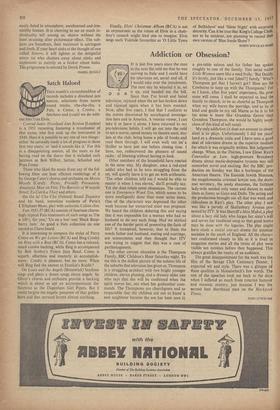Addiction or Obsession?
IT is just five years since the man in the next flat told me that he was moving to Italy and I could have his television set, aerial and all, if I would take over the instalments. The next day he wheeled it in, set it up, and handed me. the bill. Since then I've loved and hated television, rejoiced when the set has broken down and rejoiced again when it has been mended. Now, after five years, I find that I conform to the norms discovered by sociological investiga- tion here and in America. A veteran viewer, I can take it or leave it alone. I have returned to my pre-television habits. I will go out into the cold to see a movie, spend money on theatre seats, stay late at the club, bring home a pile of books and read them through. I will even walk out on a thriller to have just one before closing time. I have, too, rediscovered the pleasure of sound radio : of listening without having to look.
Other members of the household have reacted in the same way. My daughter, once a red-eyed addict who had to be torn struggling from the set, will quietly leave it to get on with arithmetic. 'The other children told me I would be able to master it when I was eleven,' she'll proudly say. Yet she does retain some obsessions. The current one is Emergency Ward Ten, which seems to be more intelligently done than most series items. One of the characters was depressed the other week because her unmarried sister was pregnant. We heard the children debating this and saying that it was impossible for a woman who had no husband to do any such thing. Had we shirked one of the harder parts of presenting the facts of life? It transpired, however, that to them the words father and husband, mating and marriage, are synonymous and they thought that ITV was trying to suggest that this was a case of parthenogenesis.
The other current obsession is the Thompson Family, BBC Children's Hour Saturday night. To me this is the dullest picture of the tedious life of the suburbs that television has given us. Thompson is a struggling architect with two bright younger children, eleven plussing, and a dreamy older one who says that she will be confirmed when the spirit moves her, not when her godmother com- mands, The Thompsons are churchgoers and so respectable that the children are not to know a new neighbour because the son has been seen in
a pin-table saloon and his father has spoken roughly to one of the family. This serial makes Little Women seem like a mad frolic. 'But Daddy, it's lovely, just like a real [ideal?] family.' What's Thompson got that I haven't got? How are the Cowburns to keep up with the Thompsons? For as I know, after five years' experience, the pres- sures will come. I shall be expected to lead the family to church, to be as cheerful as Thompson when my wife burns the porridge, and to be as kind and gentle to my old Mama as he is to his (as mine is more like Grandma Grove than Grandma Thompson, she would be highly suspi- cious of this kind of soft soap).
My only addiction (it does not amount to obses- sion) is to plays. Unfortunately I did ten years' hard as a dramatic critic and I have seen a good deal of television drama in the superior medium for which it was originally written. But judgments change. When, in the Thirties, I saw Elmer Rice's Counsellor at Law, high-pressure Broadway drama about manic-depressive tycoons was still somewhat novel and exciting. But the BBC pro- duction on Sunday was like a burlesque of the American theatre. The Eastside Jewish Momma, the megalomaniac criminal lawyer son, the, door- mat secretary, the seedy shammas, the faithless lady-wife needed only tunes and dances to make them as funny as Guys and Dolls. The acting and the production brought out all that was weak and ridiculous in Rice's play. The other play I saw was like a parody of Shaftesbury Avenue pre- sented by ITV. It was Sherriff's Miss Mabel, a play about a lacy old lady who forges her sister's will and serves her toadstool soup so that good works may' be done with the legacies. The play might have made a useful one-act drama for amateur societies in the south of England. All the charac- ters conformed closely to life as it is lived in magazine stories and all the twists of plot were visible ten minutes before they happened. This always gratifies the vanity of an audience.
The great disappointment for the week was the film of the Savage Club Centenary Dinner. I expected wit and style. There was a glimpse of these qualities in Moiseiwitsch's few words. The rest of the speeches took me back to the days when I suffered so much from rotarian humour and masonic oratory, just because I was the second best shorthand man on the Blackpool Times.
JOHN COWBURN






































 Previous page
Previous page